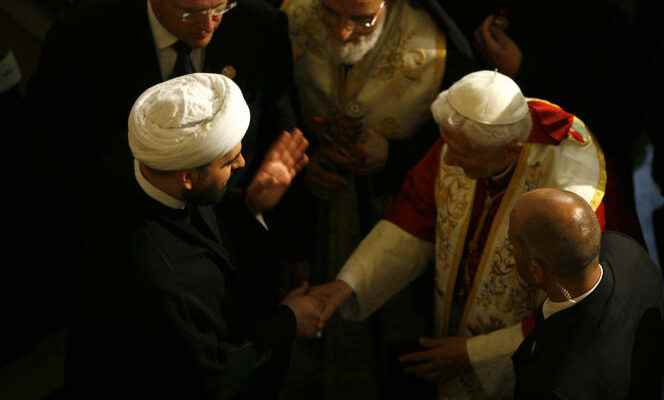Recognized theologian, actor of the ecumenical council Vatican II, where he worked in particular on the reflection renewing the relations of the Catholic Church with the Jews, Benedict XVI has, however, during his pontificate, maintained ambiguous relations with the other Christian confessions and the monotheistic religions.
While he had displayed his desire to make ecumenism a “fundamental cause” of his pontificate, he annoyed the Protestants by repeating that the Catholic Church holds the truth of the Christian faith. And he divided the Anglicans by opening the doors of Rome to priests and faithful who disagreed with the evolution, considered too progressive, of Anglicanism. In fact, the dissidents did not rush. On the other hand, relations with Orthodoxy, battered during the previous pontificate, have experienced a certain upturn.
With regard to Judaism, this German pope had actively participated in the Jewish-Christian rapprochement operated by his predecessor. He had supported him, especially in the repentance of the Church for the faults committed against the Jews. Against all expectation, Benedict XVI’s relations with the Jews will experience occasional tensions, which do not call this understanding into question. The tensions began in 2006, during his trip to Auschwitz. Pope stresses horror of extermination of Jews, but arouses criticism by judging that Nazism was made “of a group of criminals”.
Crisis of confidence
In July 2007, new controversy with the liberalization of the Latin Mass. The old missal takes up the Good Friday prayer, which evokes the conversion of the Jews to Christianity. In January 2009, the lifting of the excommunication of fundamentalist bishops, including a Holocaust denier, provoked a new crisis of confidence between the Vatican and Jewish communities throughout the world. Despite statements condemning anti-Semitism, Benedict XVI’s trip to Israel a few months later was not enough to reassure some Jews.
At the end of 2009, his decision to launch the process of beatification of Pope Pius XII, controversial for his attitude towards the Jews and the Nazi regime during the Second World War, again cooled relations at the highest institutional level. .
But it was with the Muslims that things got off to the worst start. In September 2006, the Pope gave a speech on faith and reason in Regensburg. He slips in a quote from a Byzantine emperor, evoking a violence that would be intrinsic to Islam. The Muslim world is outraged; the pope must apologize. This episode will paradoxically lead Benedict XVI to take an interest in Islam, which he did not know. A Catholic-Muslim forum was set up on the initiative of Muslim intellectuals and scholars. It met for the first time in 2008, in Rome.
You have 13.49% of this article left to read. The following is for subscribers only.
